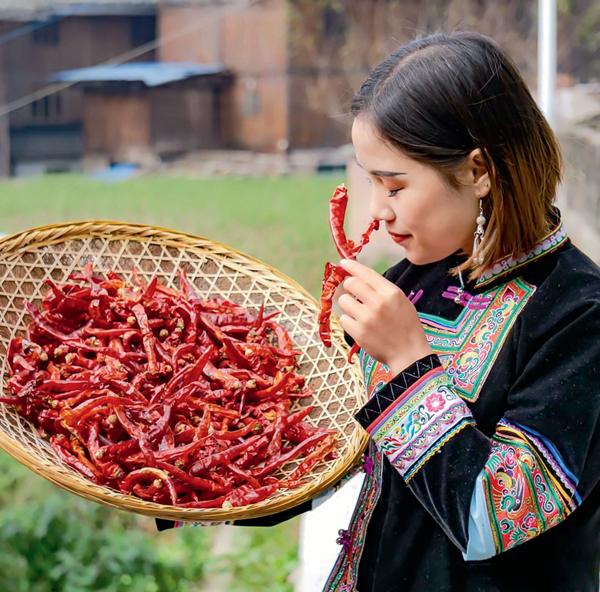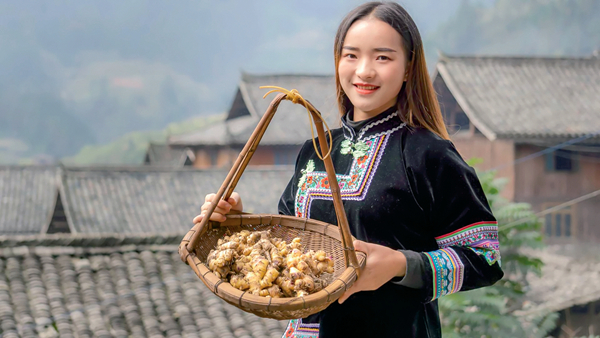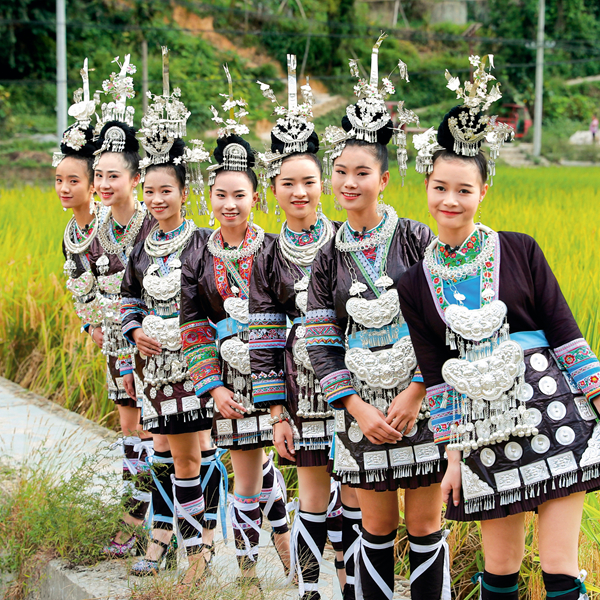Dong Internet Celebrities Help Lift Village out of Poverty
 |
| A group of women from the ethnic Dong village of Gaibao, in Liping County, Qiandongnan Miao and Dong Autonomous Prefecture, in Southwest China's Guizhou Province, take turns playing the seven mythical Dong fairies. |
A group of women from the ethnic Dong village of Gaibao, in Liping County, Qiandongnan Miao and Dong Autonomous Prefecture, in Southwest China's Guizhou Province, are using livestreaming and short videos to promote their ethnic culture, agricultural products and tourism resources. During filming, they take turns playing the seven mythical Dong fairies, and some of their works are online sensations.
Wearing traditional garments of the ethnic group, the Dong women show viewers various aspects of Dong people's lives, such as how to make traditional snacks, like rice cakes, and how to raise fish in paddy fields, design embroideries and perform farm work.
The livestreaming and short videos have attracted public attention to the village, and they have helped lift the village out of poverty.
A video showing Dong women catching fish in a paddy field has garnered more than 7.2 million views, and more than 40,000 likes and comments, since its debut on Chinese video-sharing platform Kuaishou on July 9, 2019.
 |
| One of the "Seven Dong Fairies" promotes the agricultural product pepper. |
 |
| One of the "Seven Dong Fairies" promotes the agricultural product ginger. |
Reducing Poverty
Wu Yusheng, first secretary of the village, suggested the idea to use short videos to record Dong people's lives in 2018, in a bid to connect the remote village with the outside world.
Although the mountainous village boasts a picturesque landscape, its transportation infrastructure is poor, due to its unfavorable geographical location.
It takes more than four hours to travel the approximately 100 kilometers of winding road from Gaibao to downtown Liping.
However, the lack of convenient transportation has helped preserve the culture of the Dong ethnic group. Its primitive wooden residences, natural resources and traditional customs are well protected.
On February 14, 2018, the first day that Wu served as the village's first secretary, he accepted the major responsibility of leading the villagers out of poverty. He then spent one month conducting investigations in the village.
Wu concluded all of the village's unique treasures, such as its local crafts and the intangible cultural heritage pipa (four-stringed Chinese lute) song, could be publicized on online video platforms efficiently, at a very low cost, and thus transforming them into economic benefits.
Then, he had the grand idea of building the village into a romantic paradise. His plan was rebuffed by other village cadres, who were quite conservative and did not really know how to use smart phones, not to mention how to use the phones to make money. They did not agree with Wu, and insisted that raising pigs was more reasonable than shooting videos.
Undeterred, Wu borrowed 50,000 yuan (US $7,143) from the village committee, and he promised the profits from the project would be given to the committee. He gave his word that he would cover the deficit if his plan failed.
He was frequently seen in the village shooting short videos with two mobile phones and a tripod.
 |
| Wu Yusheng(1st, R) and the "Seven Dong Fairies" take a photo with a foreigner. |
'Seven Dong Fairies'
The village's beautiful scenery, tasty food and traditional bullfights, as well as the Dong-style stilted architecture, were the central attractions of his videos. However, the clips received few clicks, and they soon disappeared from public view. His account had about 1,000 followers.
Then, a special day arrived. Wu heard about the legendary tale of seven fairies, and that story inspired him. He looked for a group of Dong women to be the village's brand ambassadors.
He said the candidates should look nice and graceful, and he added they should not be self-conscious in front of a lens.
Yang Yanjiao, the eldest "fairy," is the only married woman on the team. The youngest "fairy," Wu Meiqiong, 13, is a left-behind teenager who is living with her grandparents.
Although they have been nicknamed the "Seven Dong Fairies," the team has more than seven members. Some of the members are still students.
On the Kuaishou platform, there are more than 130 video clips highlighting the team's agricultural work, such as the spring ploughing, planting and the harvesting of farm produce.
"There are so many things worth shooting, but it is the local villagers' authentic idyllic lifestyle that attracts and touches people the most," Wu Yusheng explained.
Raising fish in paddy fields is the most ancient, and traditional, Dong farming method. When the daohua, or rice flowers, fall on the water, the fish eat them; therefore, the fish are called daohua fish. Wu Lanxiang, a team member, said the first video that featured the team catching fish earned the village more than 6,000 yuan (US $857) in orders for fish. The village sold all of the fish that day.
"Most of the videos were shot in a quite natural state, which is just the routine of our lives, not hard, but very happy. But there are also some videos that were taken when it was cold and wet, like catching fish in the fields in winter," said Wu Yusheng.
Now, all of the team's members have accounts on China's major video-sharing platforms, including Douyin, Kuaishou and Huoshan, says Wu Yusheng. He adds the team promotes the village's resources, and the Dong culture, via livestream, and that is expanding the village's presence on the Internet.
The "Seven Dong Fairies" of the ethnic group have more than 362,000 followers on Kuaishou. Their media work has reportedly yielded more than 1 million yuan (US $142,857) in profit for the village over the past year and a half.
The income was derived from sightseeing and sales of local specialties, ranging from traditional clothing and embroideries to farm produce, like ginger.
What makes the team most proud is the fact more people get to experience the beauty of their hometown, and the fact their videos have boosted the sales of Dong rice and embroideries. Many of the impoverished households in the village have escaped poverty as a result of the online marketing.
The team's members have become Internet celebrities, and they have not only gained fame, but through the short videos have inspired local women to start their own businesses, including restaurants, textile and embroidery workshops, and livestream marketing.
In the past, most of the women in the village were engaged in farming, or they were migrant workers in cities.
 |
| The "Seven Dong Fairies" |
Bringing Changes
In June 2019, the "Seven Dong Fairies" and Wu Yusheng were invited to participate in a CCTV broadcast.
Wu Lanxiang said she had never thought of appearing on such a grand stage, adding she felt a sense of responsibility and that she recognized what they do is of great significance for poor families, sales promotions and the development of local tourism.
The village also raised 200,000 yuan (US $28,571) from among its residents. The fund was divided into 200 shares, each worth 1,000 yuan (US $143). The village's committee said the money will be used to shoot videos and develop the village's tourism, agriculture and craft industries.
The economic benefits brought by the "Seven Dong Fairies" have triggered more profound impacts on villagers, Wu Yusheng says. For example, more people have returned to the village in search of business opportunities.
"Now, many Internet users travel thousands of miles to visit Gaibao Village after they see its green mountains and colorful Dong culture, which also brings opportunities for the village's development," Wu Yusheng added.
"I used to work as a migrant worker. Our village was originally a small, nameless place, but through the promotion of the 'Seven Dong Fairies,' it has gradually become known by the outside world. So, I came back to run a minsu (private accommodations rented to tourists)," said Quan Hongsen, a villager. His minsu has received several groups of guests, including foreign tourists. He has also mobilized other villagers to join him.
"Using short video platforms to promote ethnic culture and intangible cultural heritage, and to help poor families get out of poverty, is a trend, and I just followed the trend," said Wu Yusheng. Making sure the Dong culture is rooted in the hearts of the public, and becomes a real Internet presence through the short video platforms, is his greater goal.
By the end of this year, Wu Yusheng will finish his term as a poverty-relief official in the village. But the media work of "Seven Dong Fairies" will embrace a new start, rather than come to an end.
"Our task of lifting the whole village out of poverty was realized by the end of 2018. The next step will be focusing on rural revitalization. The 'Seven Dong Fairies' team is also willing to stay in the countryside to continue … their efforts in the inheritance of Dong culture and rural revitalization," Wu Yusheng noted.
Women are being encouraged to improve self-management and set up economic organizations, such as cooperatives, travel agencies and agricultural product sales companies, to help them connect with the outside world for better development, Wu Yusheng added.
Photos Supplied by Wu Yusheng
(Women of China English Monthly April 2020 issue)
Please understand that womenofchina.cn,a non-profit, information-communication website, cannot reach every writer before using articles and images. For copyright issues, please contact us by emailing: website@womenofchina.cn. The articles published and opinions expressed on this website represent the opinions of writers and are not necessarily shared by womenofchina.cn.






.jpg)

 WeChat
WeChat Weibo
Weibo 京公网安备 11010102004314号
京公网安备 11010102004314号